IJCRR - 13(15), August, 2021
Pages: 175-180
Date of Publication: 10-Aug-2021
Print Article
Download XML Download PDF
A Study of Mental Health of Ph.D. Students in Relation to Research Environment and Other Demographic Variables in Haryana State Universities
Author: Madhuri Hooda, Menka Choudhary
Category: Healthcare
Abstract:Introduction: Mental Health is a very comprehensive term that different psychologists, psychiatrists, psychopaths, health experts have tried to define in their unique ways. But a single and best definition is well-nigh possible. The study of mental health has become the chief course of study of modern time in almost all the countries across the globe, especially in India, a fast-developing economy. Initially, a Ph.D. student joins the doctoral program with zeal to learn, discover, and contribute to the stock of knowledge. He/she does so out of creative urges, hidden potential and sometimes out of unemployability and good incentives provided by funding agencies. But afterwards, the existing research culture and practices impose on him several limitations and the student does not get the expected and required environment, guidance and support, supervision, etc. All this continue to burden his mind and consequently, the student starts showing declined motivation and interest in the study which further result in depression and fear of failure. Aim: In this study, the researcher wants to study the mental health of students about the research environment and other demographic variables in Haryana state universities. Methodology: A sample of 500 PhD students were taken by using random sampling. A self-prepared questioner in the form of google form was used for data collection. Result: The result of the study revealed that gender and year of registration were significantly affected mental health. On the other hand, it also revealed that marital status, stream and gender of supervisor was not significantly affected mental health. The study also showed a positive significant correlation between mental health and the research environment. Conclusion: After going through the research result investigator conclude that for improving the mental health of students, every institute should organise workshops, seminars and counselling sessions.
Keywords: Demographical variables, Haryana State universities, Mental health, PhD students, Research environment
Full Text:
INTRODUCTION:
As it is not a hidden fact that the 21st century is known for the growth and expansion of science and technology in almost all walks of life on this globe. This rapid and unplanned invention and expansion of technologies, especially internet and communication technologies, has not come for India less than a thunder-stroke. Not only the technological advancements, but the unplanned and unpredicted explosion in higher education and higher education institutions have left India shocked. Undoubtedly, quality of education and then research at higher education institutions are certain to improve the quality of life, the standard of living, and ethics of life and to make India a global knowledge economy.1 Equally worth noticing is that India is the youngest nation on the globe. Though full of cultural, regional, linguistic diversity, India has in abundance creative, young and aspiring minds. Higher education is the one way to channelize their creative urges and impulses through qualitative education and research to yield productive outcomes that will certainly contribute towards the prosperity of our nation. For the effective growth of a nation, Mental Health is a very comprehensive term that different psychologists, psychiatrists, psychopaths, health experts have tried to define in their unique ways. But a single and best definition is well-nigh possible. The study of mental health has become the chief course of study of modern time in almost all the countries across the globe,2 especially in India, a fast-developing economy. The progress and prosperity of a nation directly depend upon the overall health of its citizen, of which psychological makeup is the main component. It becomes inevitable for stakeholders in all circumstances to ensure sound mental health for its incoming generation by providing better education and health care services. The present paper as it studies the relationship between mental health and research environment, is significant from many points of view, especially for improving the ongoing mechanical and stereotyped research culture. Research, as it is regarded inevitable in a nation’s development, is an intellectual activity that is incomplete without the researcher of a sound mental makeup.3 Therefore, it becomes more pertinent to understand the meaning of this important variable of the study.
The mental health of PhD. Students:
It is pre-assumed that a student looking forward to pursuing a PhD is likely to display outstanding general and research aptitude. He/she is also expected to possess sound physical and mental health. Undertaking research projects is not everyone’s cup of tea but it demands on the part of the researcher a high level of calibre, interest and enthusiasm, zeal to discover, untiring efforts, the smart and well-thought economy of resources. Searching and discovering problems, exploring and explaining the day and night keep a researcher in a state of constant turmoil, stress and strain, anxiety and other unwanted psychological fears.4 A research may feel at times broken down and depressed. Such a situation may take him/her out of routine making him ill or uneasy. A researcher with sound mental makeup can easily cope-up with incoming stress and depression and can keep himself self-managed. Research outcomes are also a function of the researcher’s well-being, especially emotional and psychological ones. Research is a very systematic, organised, well planned and problem-solving activity and is likely to produce outcomes that will solve problems of locality, society, nation, environment and economy and humanity at large.5 In brief, we can say that the mental health of a PhD student is of great importance and can never be overlooked as it may result in the wastage of resources along with personal harm to the student.6
The rationale of the Study:
There have been many studies on mental health and well-being of different stakeholders of education namely students, teachers, managers, administrators, etc. and sufficient literature exists that could guide a researcher in getting hold of the concept of mental health, possible causes, measures to reduce the mental disorders and so on. It is also true that there is a great shortage of studies regarding the mental health of PhD students about their research environment. Equally worth mentioning is the fact that, in India, there is a terrible dearth of academic guidance and counselling at the university level, especially at the research level. In the lack of suitable literature and counselling facilities, researchers have to undergo a variety of mental disorders ranging from slight fear and depression to severe health malfunctioning. There is ample evidence that many students undergoing research have to face different hardships during their studies in terms of academic load, lack of finance, imposed decisions, emotional breakdown, mental blackmailing, sexual harassment, and many more. These issues should be given due focus and share and it is high time when multiple studies should be conducted for the well-being of researchers at various levels of education, especially at the PhD level. The present paper aims at exploring the concept of mental health and research environment and their possible co-relationship on different demographic variables with sufficient well-proven evidence. The result of the studies could provide the base for academic guidance and counselling facilities and many newer future studies. It will contribute toward new knowledge and literature and enrich the existing literature over the issue of mental health of PhD students. The results of the project study will provide a professional ground for the study, classification, treatment of mental health of PhD students and provide an insight to plan strategies to improve and build up an effective research environment.
OBJECTIVES OF THE STUDY:
-
To study and compare the mental health of PhD students based on gender.
-
To study and compare the mental health of PhD students based on the stream.
-
To study and compare the mental health of PhD students based on marital status.
-
To study and compare the mental health of PhD students based on year of registration.
-
To study and compare the mental health of PhD students based on the gender of the supervisor.
-
To study the relationship between Research Environment and Mental Health of PhD students.
HYPOTHESIS OF THE STUDY:
-
There is no significant difference between the mental health of PhD students based on gender.
-
There is no significant difference between the mental health of PhD students based on the stream.
-
There is no significant difference between the mental health of PhD students based on marital status.
-
There is no significant difference between the mental health of PhD students based on the year of registration.
-
There is no significant difference between the mental health of PhD students based on the gender of the supervisor.
-
There is no significant relationship between the Research Environment and the Mental Health of PhD students.
REVIEW OF THE RELATED LITERATURE:
Nami, Nami and Eishani conducted a study on “The Students' Mental Health Status” and found that 37.37% of students having mental disorders.7Irfan carried out a study on “Mental health and factors related to mental health among Pakistani university students” and revealed a positive correlation between mental health and another variable like extraversion, father’s warmth, self-esteem along significant gender differences. This study also showed that the mental health of male students was more than female students and the students having parents with the lowest income also showed lower mental health levels.8Peterse carried out a study on “Addressing the mental health crisis among doctoral researchers”. This study revealed that early-career students faced significant mental health issues and the study also recommended some measures for improving the mental health of doctoral students.9Hazell, et al. conducted a study on “Understanding the mental health of doctoral researchers: A mixed-methods systematic review with meta-analysis and meta-synthesis.” This study showed that PhD students having significantly higher stress than the normal population and the female students were at more risk than the male students. This study also revealed a positive relationship between students and supervisor is helpful for positive mental health.10Mattijssen studied “In the eye of the storm: The mental health situation of PhD candidates” during lockdown. The result of the study revealed that 47% of candidates found on the risk of developing the psychiatric disorder and More than one-third of the total sample i.e. 39% showed symptoms related to burnout.11
RESEARCH METHODOLOGY, SAMPLING AND TOOL:
In the given study the investigator used a survey method so a sample of 500 PhD students from Haryana state universities was taken by using simple random sampling (lottery method). The tool used in this study was prepared by investigators. This tool has three basic parts i.e., demographic information, mental health-related questions, and research environment-related questions. The self-prepared questionnaire was shared with scholars by using Google Forms.
RESULT AND INTERPRETATIONS:
1.Objective: To study and compare the mental health of PhD students based on gender.
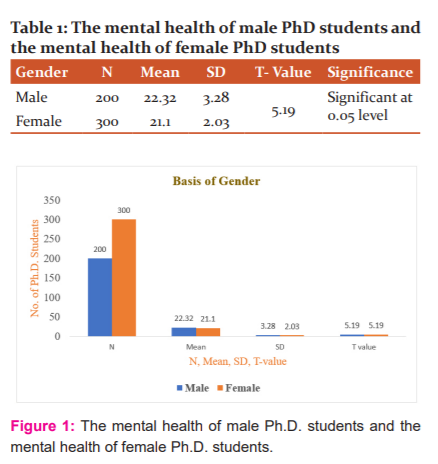
Interpretation: As the table 1 & figure 1 clearly show that t-value for the mental health of male PhD students and the mental health of female PhD students is 5.19, which is significant at 0.01 level of significance with df 499. So, the null hypothesis, “There is no significant difference between the mental health of PhD students based on gender.” is rejected. The difference between both means is trustworthy and the mean of male PhD students is significantly high. It shows that male students have a high level of mental health than their counterparts.
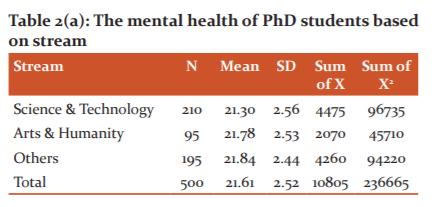
Interpretation: As table 2(a), 2(b) & figure 2 clearly show that the F-value for the mental health of PhD students based on stream is 2.61, which is not significant at 0.05 level of significance with df 499. So, the null hypothesis, “There is no significant difference between the mental health of PhD students based on the stream.” is accepted. It means the level of mental health does not affect by the type of stream.

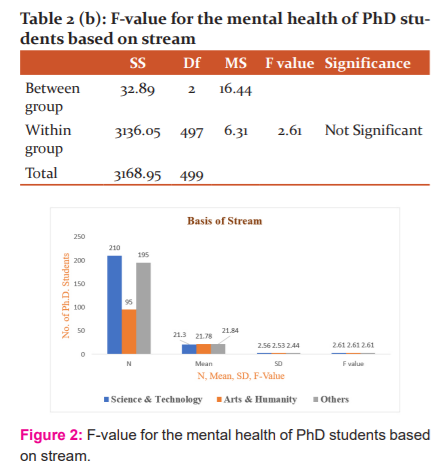
Interpretation: As table 2(a), 2(b) & figure 2 clearly show that the F-value for the mental health of PhD students based on stream is 2.61, which is not significant at 0.05 level of significance with df 499. So, the null hypothesis, “There is no significant difference between the mental health of PhD students based on the stream.” is accepted. It means the level of mental health does not affect by the type of stream.
3Objective: To study and compare the mental health of PhD students based on marital status.
Hypothesis: There is no significant difference between the mental health of PhD students based on marital status.
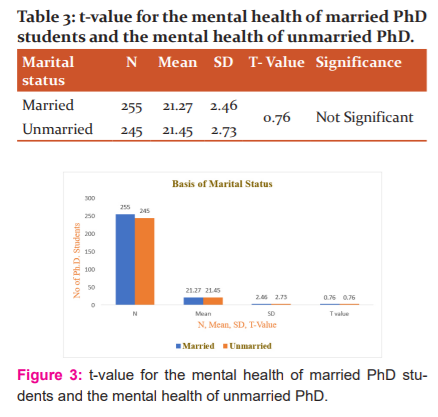
Interpretation: As table 3 & figure 3 clearly show that the t-value for the mental health of married PhD students and the mental health of unmarried PhD students is 0.76, which is not significant at 0.05 level of significance with df 499. So, the null hypothesis, “There is no significant difference between the mental health of PhD students based on marital status.” is retained. It revealed that the marital status of students does not affect the level of mental health.
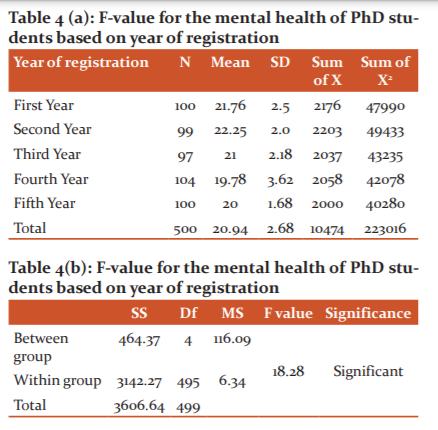
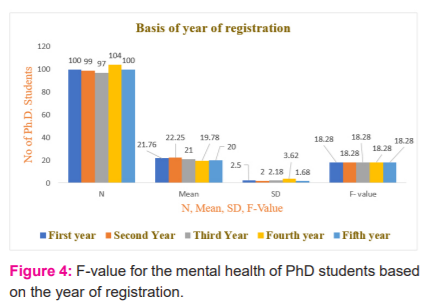
Interpretation: As table 4(a), 4(b) & figure 4 clearly show that the F-value for the mental health of PhD students based on the year of registration is 18.28, which is significant with df 499. So, the null hypothesis, “There is no significant difference between the mental health of PhD students based on the year of registration.” is rejected. The difference between the mean is trustworthy and showed that third-year students have a lower level of mental health. On the other hand, fourth-year students have a higher level of mental health.
Hypothesis: There is no significant difference between the mental health of PhD students based on the gender of the supervisor.
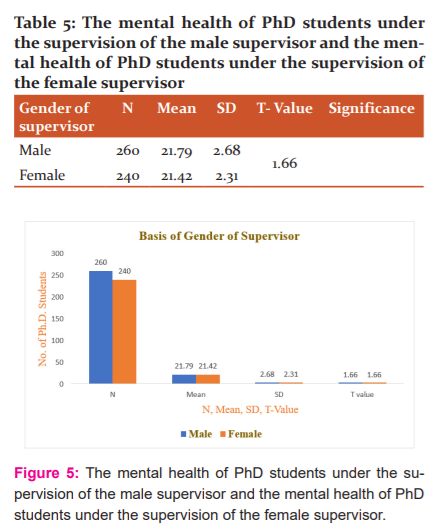
Interpretation: As table 5 & figure 5 clearly show that the t-value for the mental health of PhD students under the supervision of a male supervisor and the mental health of PhD students under the supervision of a female supervisor is 1.66, which is not significant at 0.05 level of significance with df 499. So, the null hypothesis, “There is no significant difference between the mental health of PhD students based on the gender of supervisor.” is retained. It revealed that the gender of the supervisor does not affect the level of mental health of students.
6 Objective: To study the relationship between Research Environment and mental health of PhD students.
Hypothesis: There is no relationship between Research Environment and mental health of PhD students.
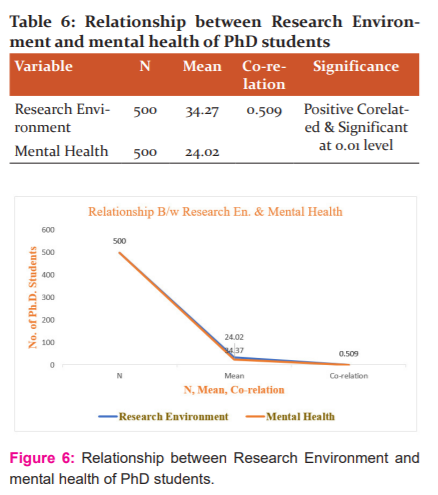
Interpretation: Table 6 & figure 6 depicted that the relationship between research environment and mental health is significant. The calculated value for this is 0.509 which is larger than the critical value (i.e., 0.354 at 0.01 level of significance). So, the hypothesis, “There is no relationship between Research Environment and mental health of PhD students” is rejected. The result revealed a positive co-relationship between the research environment and the mental health of the students.
Discussion:
After going through this research, investigators found a significant difference in the level of mental health of PhD students based on gender and year of registration. Male students are more healthy than female students and fourth-year students are more mentally healthy than their counterparts. This finding is also in agreement with the study conducted by Irfa and Hazell. This research also revealed that stream, marital status and gender of supervisor does not affect the mental health of students. The finding related to marital status is found in disagreement with the study conducted by Gaur which endorses that marital status significantly affects mental health.11 A positive relationship between mental health and research environment was found in this research. This result agrees with the study conducted by Deb which examine the depression among Indian students and its association with perceived university academic environment, living arrangement and personal issues.12
Conclusion:
The overall conclusion of this research revealed that mental health is the basic pillar of any research and only a person having good mental health can contribute to health research. So, every institution should organise some workshops, seminars etc to aware people for positive mental health. Institutions should provide mental health counselling to students on a compulsory basis.
Acknowledgement: Thank you to the Students’ Welfare Department (DSW) for their funding to support this work; and thank you to Maharshi Dayanand University, Rohtak (Hr.) India for providing fund under Radhakrishnan fund of DSW for project titled “A Study of Mental Health of PhD students concerning Research Environment and other demographic variables in Haryana State Universities.”
Conflict of Interest: There is no conflict of interest.
Source of funding: This paper has been published under the funding provided by DSW, Maharshi Dayanand University, Rohtak-124001, Haryana (India).
Contribution of authors: The Project Investigator (Dr. Menka Choudhary) worked with all the administrative and academic work with the help of Co-PI (Dr. Madhuri Hooda). The administrative work included submission of the project proposal to the funding Department of the institute i.e under Radhakrishnan Fund of DSW, M.D.U. Rohtak, giving a presentation for the proposal in Departmental Committee, receiving funds to carry out the project, entire expenditure to carry out the project. The academic work included; reviewing the related literature and working for delimiting the study, framing design of the study, data collection and analysis of data and reporting of findings was done by PI jointly with Co-PI.
References:
-
Bland, C, Ruffin IV, Mack. (1992). Characteristics of a productive research environment: A literature review. Academic medicine: Journal Ame Med Coun. 67. 385-97. 10.1097/00001888-199206000-00010.
-
Galderisi, S., Heinz, A., Kastrup, M., Beezhold, J., Sartorius, N. (2015). Toward a new definition of mental health. World psychiatry: Official J WPA, 14(2), 231–233. https://doi.org/10.1002/wps.20231
-
Guthrie S, Lichten CA, Van Belle J, Ball S, Knack A, Hofman J. Understanding mental health in the research environment: A Rapid Evidence Assessment. Rand Health quarter. 2018; 7(3): 2.
-
Leighton, Sharon, Dogra, Nisha. (2009). Defining mental health and mental illness.
-
Katia L, Anseel F, Beuckelaer AD, Heyden JV. Work organization and mental health problems in PhD students. Res Policy. 2014; 46(4), 868-879.
-
Slobodan L, Sosic B. Environment and mental health. Psychiatria Danubian. 2014;24 (3). 272-6.
-
Nami Y, Nami MS, Eishani KA. The Students' Mental Health Status. Procedia - Social and Behavioral Sciences.2014;114: 840 – 844.
-
Irfan U. Mental health and factors related to mental health among Pakistani university students (Doctoral Thesis) Christchurch, New Zealand. 2016.
-
Peter Y, Lasser J, Caglio G, Stoltmann K, Rusiecka D, Schmidt M. Addressing the mental health crisis among doctoral researchers. The elephant in the Lab.2018; 4(3): 451. https://doi.org/10.5281/zenodo.1402423
-
Hazell CM, Chapman L, Valeix SF, Roberts P, Niven JE, Berry C.Understanding the mental health of doctoral researchers: a mixed-methods systematic review with meta-analysis and meta-synthesis. Syst Rev. 2019; 9: 197. https://doi.org/10.1186/s13643-020-01443-1
-
Mattijssen, L.M.S., Bergmans, J. E., Weijden, I.C.M.V., Teelken, J.C. (2021). In the eye of the storm: the mental health situation of PhD candidates. Perspect Med Edu.2021;10: 71–72. https://doi.org/10.1007/s40037-020-00639-4
-
Deb S, Banu PR, Thomas S, Vardhan RV, Rao PT, Khawaja N. Depression among Indian university students and its association with perceived university academic environment, living arrangements and personal issues. Asian J Psychiar.2016; 23, 108-117. DOI: 10.1016/j.ajp.2016.07.010
|






 This work is licensed under a Creative Commons Attribution-NonCommercial 4.0 International License
This work is licensed under a Creative Commons Attribution-NonCommercial 4.0 International License